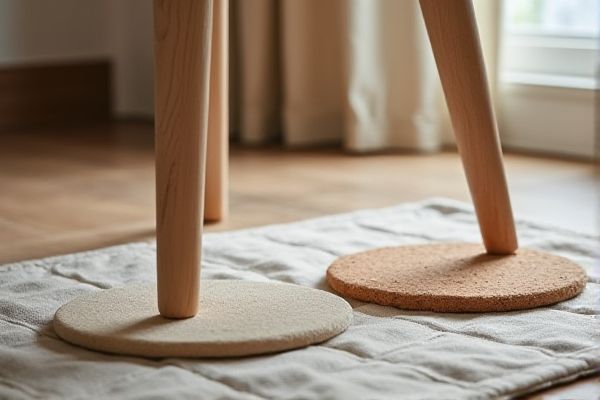
Felt pads provide excellent floor protection by preventing scratches and reducing noise, ideal for smooth surfaces like hardwood or tile, while cork pads offer durability and moisture resistance, making them suitable for uneven floors or outdoor use. Discover which option best suits Your chair legs and flooring in the rest of this article.
Table of Comparison
| Feature | Felt Pad | Cork Pad |
|---|---|---|
| Material | Soft, dense wool fibers | Natural cork bark |
| Purpose | Prevents scratches and floor damage | Prevents scratches, provides grip and cushioning |
| Floor Compatibility | Best for hardwood, laminate, tile | Works well on hardwood, tile, concrete |
| Durability | Moderate; may wear over time with heavy use | High; resistant to compression and wear |
| Noise Reduction | Excellent; reduces chair scraping sounds | Good; absorbs some noise but less than felt |
| Adhesion | Adheres well with glue backing | Usually glued or nailed |
| Price | Low to moderate cost | Moderate cost |
| Replacement Frequency | More frequent; pads flatten or wear down | Less frequent; maintains shape longer |
Introduction: Protecting Floors with Chair Leg Pads
Felt pads and cork pads offer distinct advantages for protecting floors from chair leg damage. Felt pads provide smooth, cushioned surfaces that reduce scratching on hardwood and tile floors, while cork pads excel in preventing dents on softer surfaces like vinyl and laminate. Choosing the right pad for your chair legs ensures your floors remain pristine while maintaining stability and ease of movement.
What Are Felt Pads?
Felt pads are soft cushioning materials made from compressed wool fibers designed to protect floors from scratches and scuffs caused by chair legs. These pads provide smooth gliding motion across hard surfaces like hardwood, tile, and laminate, reducing noise and preventing damage. Commonly self-adhesive, felt pads are easy to install and replace, making them a popular choice for maintaining both furniture and flooring integrity.
What Are Cork Pads?
Cork pads are natural, eco-friendly discs made from the bark of cork oak trees, designed to protect floors from scratches caused by chair legs. These pads provide excellent grip and cushioning, reducing noise and preventing furniture from sliding. When choosing between felt and cork pads, Cork pads offer durability and moisture resistance, making them ideal for hardwood and tile flooring.
Durability Comparison: Felt vs Cork
Felt pads offer moderate durability, gradually wearing down with frequent chair movement but providing smooth floor protection. Cork pads are highly durable, resisting compressive forces and moisture, making them ideal for heavy furniture and uneven surfaces. Your choice depends on how much wear resistance and cushioning you need for chair legs in daily use.
Floor Protection: Which Material Performs Better?
Felt pads provide superior protection for hardwood floors by cushioning chair legs and preventing scratches, while cork pads offer moderate protection with added grip to reduce slipping. Felt's soft texture absorbs impact and reduces noise, making it ideal for delicate surfaces, whereas cork's durability resists moisture but can wear faster on rough floors. Choosing felt pads for your chair legs ensures better floor preservation and smoother movement, safeguarding your flooring investment effectively.
Noise Reduction: Felt vs Cork Pads
Felt pads offer superior noise reduction for chair legs by cushioning impacts and preventing scratches on hard floors, effectively absorbing sound vibrations. Cork pads also reduce noise but to a lesser extent, as their rigid texture provides moderate cushioning and sound dampening. Choosing felt pads enhances your environment's quietness, especially in spaces with hardwood or tile flooring.
Installation and Maintenance: Ease of Use
Felt pads offer straightforward installation by simply sticking onto chair legs, requiring minimal effort and tools, while cork pads may need adhesive application or small nails for secure attachment. Felt pads require occasional replacement as they wear down or collect dirt, whereas cork pads are more durable but can require sanding or cleaning to maintain grip and appearance. Both types provide user-friendly maintenance, but felt pads generally offer quicker installation and easier upkeep for everyday use.
Cost-Effectiveness: Price and Value
Felt pads offer a cost-effective solution for chair legs by providing affordable protection against scratches and noise, with prices generally lower than cork pads. Cork pads, while slightly more expensive, deliver greater durability and natural resistance to moisture, often extending their value over time. Choosing felt or cork pads depends on Your priority between initial price savings and long-term durability for floor protection.
Aesthetic Considerations: Appearance on Furniture
Felt pads provide a soft, low-profile look that blends seamlessly with most chair legs, maintaining a sleek and understated aesthetic. Cork pads offer a natural, textured appearance that can enhance rustic or eco-friendly furniture styles while adding a subtle visual contrast. Choosing between felt and cork depends on your preference for either minimalism or organic charm on your chair legs.
Conclusion: Choosing the Right Pad for Your Needs
Felt pads offer superior floor protection and smooth gliding on hardwood, tile, and laminate surfaces, making them ideal for preventing scratches and noise. Cork pads provide excellent cushioning and grip, suitable for uneven floors or carpeted areas where stability is a priority. Selecting between felt and cork pads depends on your flooring type and whether you prioritize movement ease or firm chair stability.
 homyna.com
homyna.com